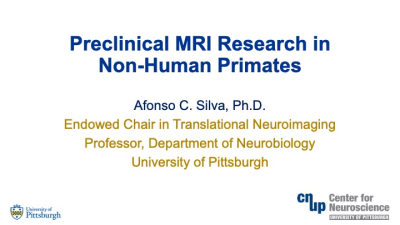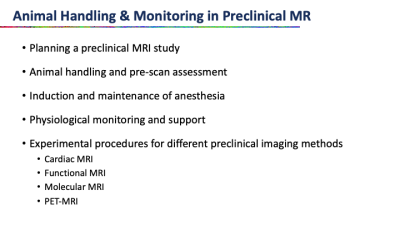Sunrise Session
Preclinical MRI: Animal Handling & Monitoring in Preclinical MR
ISMRM & SMRT Annual Meeting • 15-20 May 2021

| Concurrent 7 | 16:00 - 17:00 | Moderators: Kerstin Timm & Shella Keilholz |
 |
Preclinical MRI Research in Non-Human Primates
Afonso Silva
Preclinical MRI research of non-human primates brings in several advantages compared to humans. They allow comprehensive, multimodal investigations on the neural origins of functional hemodynamic signals, selective activation or inhibition of specific brain regions to understand their roles in complex processes such as perception and cognition, and the investigation of neural circuits with cell specificity. NHP can be imaged in state-of-the-art MRI systems with high SNR, spatial, and temporal resolution. The primary challenges are (1) anesthesia as a major confound for fMRI studies, and (2) the need to train/habituate the animals to perform specialized tasks while restrained.
|
|
 |
Animal Handling & Monitoring in Preclinical MR
Iris Zhou
Preclinical MR imaging make valuable contributions to improving our understanding of human diseases, ranging from insights into the molecular/cellular underpinnings of a disorder, to structural and functional manifestations, to the development of novel pharmacotherapeutic treatment approaches. However, the use of imaging procedures, such as anesthesia, animal preparation (e.g., fasting, premedication), blood sampling, and contrast agent injections can affect animal physiology, and entails potential health risks. We will discuss the challenges associated with setting up and carrying out preclinical MRI procedures, addressing the protocols related to animal handling, induction and maintenance of anesthesia and physiological monitoring, to maximize efficacious data.
|
The International Society for Magnetic Resonance in Medicine is accredited by the Accreditation Council for Continuing Medical Education to provide continuing medical education for physicians.